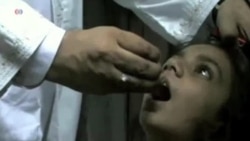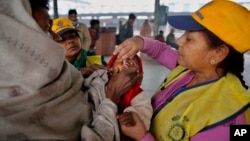For three years, India has not recorded a new case of polio, a critical achievement that puts the entire region on target to be certified polio-free.
Eradicating the crippling disease from India has been one of the greatest challenges in the global effort, costing $2 billion since 1995.
Before then, the disease claimed 50,000 to 100,000 victims every year, according to the World Health Organization, mostly children under five years old.
“There were many critics who felt it was impossible to eradicate polio from India,” said Steve Cochi, senior advisor in the global immunization division at the U.S. Centers for Disease Control and Prevention.
High population density, frequent migration, poor sanitation and weak health systems made fighting the disease a challenge.
Indian Health Minister Ghulam Nabi Azad credited the landmark achievement to “unwavering political will at the highest level, commitment of adequate financial resources, technological innovations as well as efforts of millions of workers.”
India falls under the World Health Organization’s Southeast Asia region, and WHO will meet in March to discuss certifying the region as polio-free.
Fighting rumors
One of the biggest challenges was overcoming disruptive rumors among some minority populations that the vaccine would harm their children.
The campaign recruited academic, religious and community leaders, in some cases traveling house-to-house along with vaccinators, to dispel myths.
“It took some time, and some effort, but these things always do,” Cochi said. “I think that represents one of the most outstanding success stories, not only for India but for the world.”
Convincing skeptical neighborhoods also required broadening the services the campaign provided.
"Communities have more issues other than polio," said Carol Pandak, director of Rotary International's polio eradication program.
She says Rotary clubs sponsored health camps to provide vaccines for polio as well as other diseases, along with other health services.
They also enlisted thousands of community members living in polio hotspots to talk to their neighbors and make the case for vaccination.
"They could talk to their fellow community members unlike an outsider could," she added.
Related video from Rotary International-The Gates Foundation, "The Last Polio Ward in India":
Lessons learned in India are being applied in other trouble spots.
In Pakistan, for example, where several vaccinators have been killed, the campaign is enlisting prominent Muslim leaders to support the eradication effort.
Virus spread
Pakistan, Afghanistan and Nigeria are the last three countries where polio transmission has never stopped.
Virus from Pakistan caused an outbreak in Syria last year that claimed 17 victims. Fighting in Al-Raqa has interrupted a vaccination campaign aimed at containing the outbreak.
In a statement, the World Health Organization and the United Nations Children’s Fund condemned the interruption and called on “all parties to cease fighting immediately and permit completion of the life-saving polio campaign and delivery of other life-saving humanitarian interventions.”
The largest outbreak last year was in Somalia with 183 cases. The virus also spilled over and triggered outbreaks in neighboring Kenya and Ethiopia.
Eradicating the crippling disease from India has been one of the greatest challenges in the global effort, costing $2 billion since 1995.
Before then, the disease claimed 50,000 to 100,000 victims every year, according to the World Health Organization, mostly children under five years old.
“There were many critics who felt it was impossible to eradicate polio from India,” said Steve Cochi, senior advisor in the global immunization division at the U.S. Centers for Disease Control and Prevention.
High population density, frequent migration, poor sanitation and weak health systems made fighting the disease a challenge.
Indian Health Minister Ghulam Nabi Azad credited the landmark achievement to “unwavering political will at the highest level, commitment of adequate financial resources, technological innovations as well as efforts of millions of workers.”
India falls under the World Health Organization’s Southeast Asia region, and WHO will meet in March to discuss certifying the region as polio-free.
Fighting rumors
One of the biggest challenges was overcoming disruptive rumors among some minority populations that the vaccine would harm their children.
The campaign recruited academic, religious and community leaders, in some cases traveling house-to-house along with vaccinators, to dispel myths.
“It took some time, and some effort, but these things always do,” Cochi said. “I think that represents one of the most outstanding success stories, not only for India but for the world.”
Convincing skeptical neighborhoods also required broadening the services the campaign provided.
"Communities have more issues other than polio," said Carol Pandak, director of Rotary International's polio eradication program.
She says Rotary clubs sponsored health camps to provide vaccines for polio as well as other diseases, along with other health services.
They also enlisted thousands of community members living in polio hotspots to talk to their neighbors and make the case for vaccination.
"They could talk to their fellow community members unlike an outsider could," she added.
Related video from Rotary International-The Gates Foundation, "The Last Polio Ward in India":
Lessons learned in India are being applied in other trouble spots.
In Pakistan, for example, where several vaccinators have been killed, the campaign is enlisting prominent Muslim leaders to support the eradication effort.
Virus spread
Pakistan, Afghanistan and Nigeria are the last three countries where polio transmission has never stopped.
Virus from Pakistan caused an outbreak in Syria last year that claimed 17 victims. Fighting in Al-Raqa has interrupted a vaccination campaign aimed at containing the outbreak.
In a statement, the World Health Organization and the United Nations Children’s Fund condemned the interruption and called on “all parties to cease fighting immediately and permit completion of the life-saving polio campaign and delivery of other life-saving humanitarian interventions.”
The largest outbreak last year was in Somalia with 183 cases. The virus also spilled over and triggered outbreaks in neighboring Kenya and Ethiopia.






